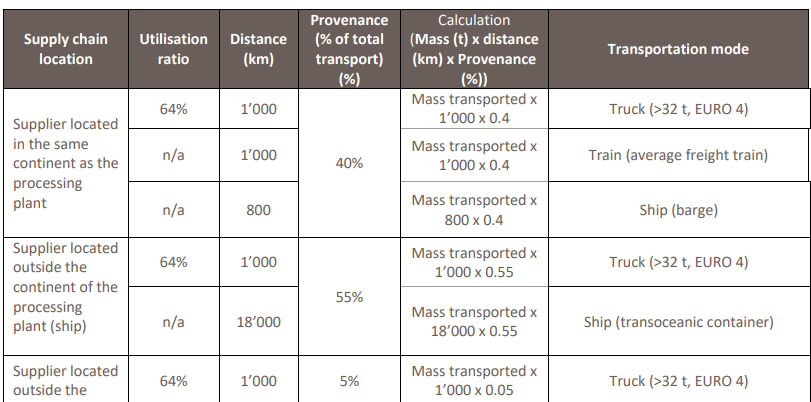Transport Distance Calculation
For PEFCR A&F v2.0 Compliance
Calculating the environmental impact of transport has never been easier. Whether detailed transport methods are known or not, this new feature ensures reliable estimates. It helps avoid overestimations for local transport and speeds up Life Cycle Assessments (LCA) with automated distance calculations.
New Capabilities in Organization Data
Transport distribution shares can now be defined and managed for each stage of the supply chain directly in Organization Data, enhancing accuracy and simplifying data input.

Fields to define in Organization Data:
1/ Transport Distribution Shares
Allocate the percentage of transport across these supply chain stages and ensure the total transport shares for each stage add up to 100% :
- Raw Materials / Semi-finished Goods / Intermediate Products
Transport for sourcing raw materials, semi-finished goods, and intermediate products.
- Assembly to Central Warehouse
From assembly sites to the central warehouse, applicable for ‘classic e-commerce’ and retail scenarios.
- Assembly to Final Client (D2C Scenario)
Direct-to-consumer deliveries, bypassing warehouses and retail stores.
- Central Warehouse to Local Warehouse
Transport between central and local warehouses in the ‘classic e-commerce’ scenario.
- Local Warehouse to Final Client
Deliveries from local warehouses to final customers in the ‘classic e-commerce’ scenario.
- Final Client to Local Warehouse (Returns)
Customer returns to local warehouses in the ‘classic e-commerce’ scenario.
- Central Warehouse to Retail/Stores
Deliveries to retail stores in the retail scenario.
- Retail/Stores to Final Client
Products picked up by customers in retail stores in the retail scenario.
- Final Client to Retail/Stores (Returns)
Customer returns to retail stores in the retail scenario.
2/ Predefined Datasets for Transport Modes
- Local Supply Chain Share: Within the same country.
- Intracontinental Supply Chain Share: Between locations on the same continent.
- International Supply Chain Share by Ship: Between continents using ships.
- International Supply Chain Share by Plane: Between continents using planes.
3/ Mandatory fields for Compliance with PEFCR A&F v2.0
- International Distribution Share: Assembly to Central Warehouse by plane.
- D2C Distribution Share: Assembly to Final Client by plane.
How it works in Product Forms?
1/ When transport mode details are missing
This approach provides tailored, scenario-based calculations without penalizing for missing data. Estimates are generated using transport shares defined in Organization Data, considering:
- Local: Transport within the same country.
- Intracontinental: Transport on the same continent.
- Intercontinental: Transport between continents.
- Default: When the location is unknown
2/ When transport mode details are provided
For specified transport methods (e.g., truck, ship, plane), the platform calculates distances automatically using Searates, ensuring faster and more precise results.
Default distances for each transport leg
Default distance scenarios are applied based on the nature of transported goods and geographical scope.
1/ Raw materials/ Semi-finished good/ Intermediate products

- Intracontinental Supply Chain Share: 1000 km by truck/ 1000 km by train/ 800 km by barge
- International Supply Chain Share by Ship: 18,000 km by ship (transoceanic container)/ 1000 km by truck
- International Supply Chain Share by Plane: 10,000 km by plane/ 1000 km by truck
2/ Assembly to Central Warehouse

- Local Supply Chain Share: 1200 km by truck
- Intracontinental Supply Chain by Barge: 800 km by barge/ 2500 km by truck
- Intracontinental Supply Chain by Train: 800 km by truck/ 2500 km by train
- International Supply Chain Share by Ship: 18,000 km by ship (transoceanic container)/ 1000 km by truck
- International Supply Chain Share by Train: 10,000 km by train/ 1000 km by truck
- International Supply Chain Share by Plane: 10,000 km by plane/ 1000 km by truck
3/ Assembly to Final Client (D2C scenario)

- Local Supply Chain Share: 1200 km by truck
- Intracontinental Supply Chain Share: 3500 km by truck
- International Supply Chain Share by Ship: 18,000 km by ship (transoceanic container)/ 1000 km by truck
- International Supply Chain Share by Plane: 10,000 km by plane/ 1000 km by truck
4/ Central Warehouse to Local Warehouse

- Intracontinental Supply Chain Share by Plane: 500 km by truck/ 3500 km by plane
5/ Local Warehouse to Final Client

- Local Supply Chain Share: 250 km by van
6/ Final Client to Local Warehouse (returns)

- Local Supply Chain Share: 250 km by van
7/ Central Warehouse to Retail/ Stores

- Local Supply Chain Share: 1200 km by truck
8/ Retail/ Stores to Final Client

- Local Supply Chain Share: 5 km by passenger car/ 5 km by van/ Others (walking, cycling etc)
9/ Final Client to Retail/ Stores (returns)

- Local Supply Chain Share: 5 km by passenger car/ 5 km by van/ others (walking, cycling etc)

